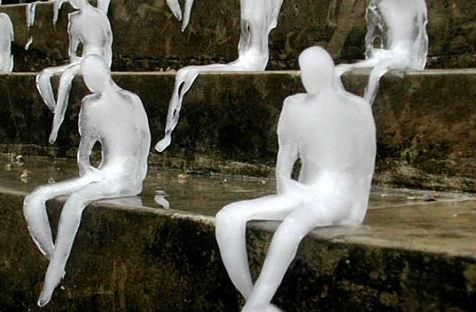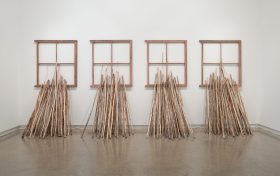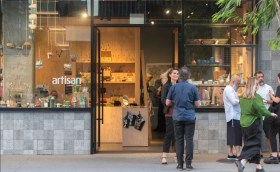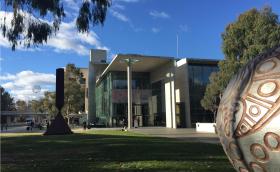With opinion polls favouring a Coalition election victory, what might an Abbott government mean for the arts and culture?
Until this week, I had thought that the arts would largely be protected from any planned austerity under an incoming Coalition government.
After the announcement yesterday of spending cuts to the Australian Research Council, I’m not so sure.
The ARC is Australia’s premier research agency. It supports high quality research by academics. Grants are funded at arms length from the government after a rigorous peer review process.
Yesterday the Coalition announced that if it wins government tomorrow, it plans to cut $103 million from the ARC in projects that Joe Hockey has labeled ‘futile’. The money will be re-allocated to research in areas like dementia.
The Coalition singled out four ARC funded projects that it argues are wasteful. Two were in philosophy, one examined sexual health in Egypt, and one researched public art about climate change.
‘Even from Opposition we’ve been able to identify projects, like $160,000 on the examination of sexuality and Islamic interpretations of reproductive health technologies in Egypt. I don’t see that as a good spend of Australian taxpayer money,’ Coalition Treasury spokesman Joe Hockey said yesterday.
What does this have to do with arts and cultural policy? Two things.
Firstly, the Coalition has singled out an arts project as wasteful. Contrary to Coalition Arts spokesman George Brandis’ repeated assertions that the Coalition will support art for its own sake, this appears to be an attack on the value of public art.
Secondly, the Coalition wants to meddle in peer review. Yesterday’s announcement amounts to a public ‘naming and shaming’ exercise.
While the overt justification is to cut back on ‘waste’, the Coalition’s issues appear to be political. For instance, in the case of Spatial Dialogues, the ARC project hosted by RMIT, the sensitive content is climate change. It’s not clear why the Coalition dislikes Spatial Dialogues. Is it because it is about climate change, or is it because it is public art?
Artists should be very worried about such an attack on peer review. Once decisions on arts funding are taken away from the arm’s length judgement of independent agencies like the ARC or the Australia Council, grant funding an quickly become politicised.
It is a relatively straightforward exercise to run through a list of arts grants, and strike out the ones that deal with topics or practices the government of the day doesn’t like. The losers can then be publicly ridiculed via ‘drops’ to friendly journalists in the popular media.
Indeed, there was a precedent for this during the Howard government. In 2003, the Australia Council’s New Media Arts Board funded a game called Escape from Woomera. A clever modification of the popular first-person shooter platform, Counter-Strike, the gameplay encouraged asylum seekers in detention to try and escape from the Woomera immigration facility.
The Howard government was furious. Then Immigration Minister Phillip Ruddock publicly criticised the grant, saying at the time that ‘the decision reflects poorly upon the Australia Council and its judgment, that the organisation should lend its name to the promotion of unlawful behaviour.’ Eighteen months later, the Australia Council abolished the entire New Media Arts Board. At the time, some saw it is a bureaucratic pay-back for the Board’s decision to fund Escape from Woomera.
The public attack on a public art project just two days before an election has concerned prominent members of the arts community. The National Association for the Visual Arts’ Tamara Winikoff told ArtsHub that ‘public art plays a cherished role in expressing the historical significance, social values and artistic aspirations of people and places and must not be abandoned lightly.’
‘It will be important for the Coalition to come to understand the value that the community places on the quality of the public realm,’ Winikoff said.
Winikoff is already concerned about the lack of profile of the visual arts during this election campaign, with existing Australia Council priorities heavily weighted towards the performing arts. Statements this week by Senator Brandis will not have assuaged her concerns. In an interview with the ABC’s Daniel Browning, he championed the role of the major performing arts organisations, singling out the Australian ballet, Australian Chamber Orchestra and Opera Australia for special mention as ‘some of the great major performing arts companies of the world.’
Artists might be less concerned if there was a concrete arts policy on the table from the Coalition. But with the release of the Coalition’s policy costings yesterday, it is now clear that the Coalition is not taking an arts or cultural policy to this election.
Instead, George Brandis has given a number of speeches and interviews in which he has argued that the Coalition has a superior “attitude” and “philosophy” to cultural policy. Ironically, an ARC grant for philosophy research was one of the projects singled out for criticism yesterday by Joe Hockey.
One thing we do know about an incoming Coalition government is that there will be cuts to arts funding. While no ‘savings’ were included in the costings document released by Hockey and Andrew Robb yesterday, Brandis has flagged at least some funding reductions in recent statements.
‘I have in mind a number of measures,’ he told the ABC this week.
‘There’s no getting away from the fact … that the country will be $300 billion in debt,’ he continued. ‘At a time when the budget is virtually in an emergency situation, I can’t promise you that there won’t be any economies.’
(Pictured: Would funding for the arts melt away under a Coalition government? (Work by Nele Azevedo))






